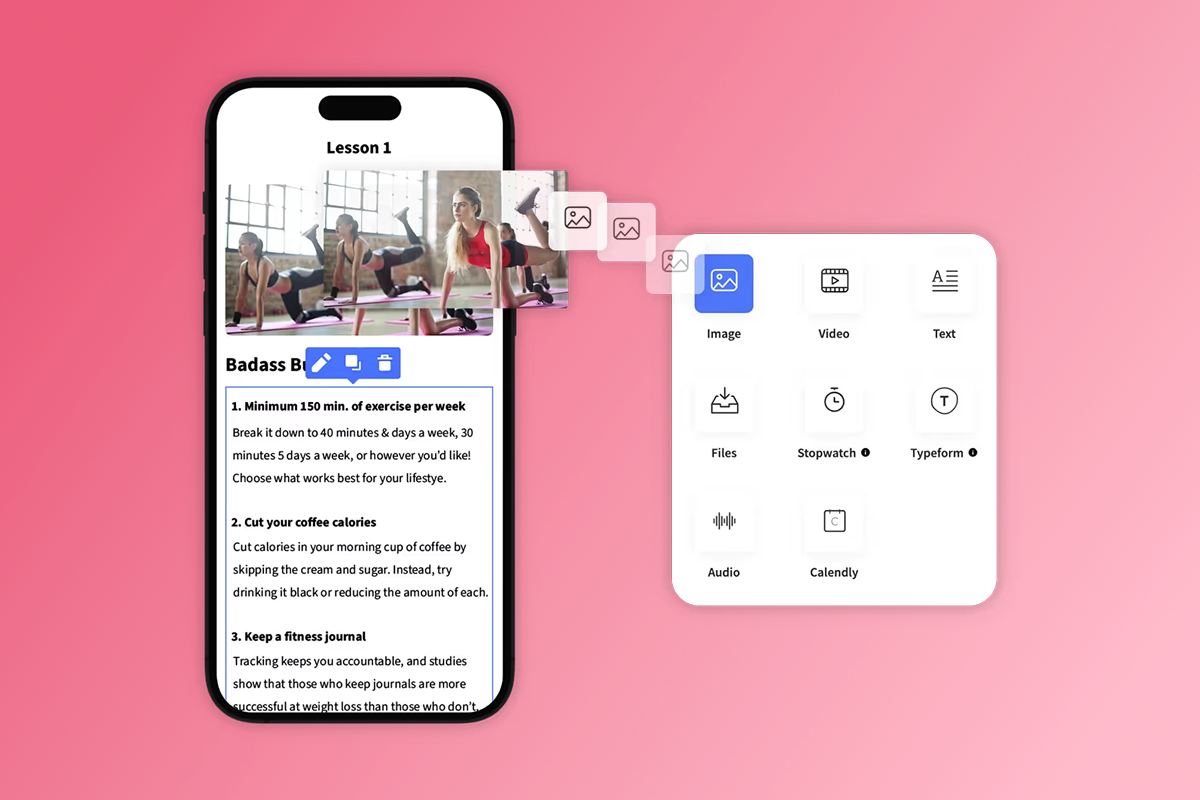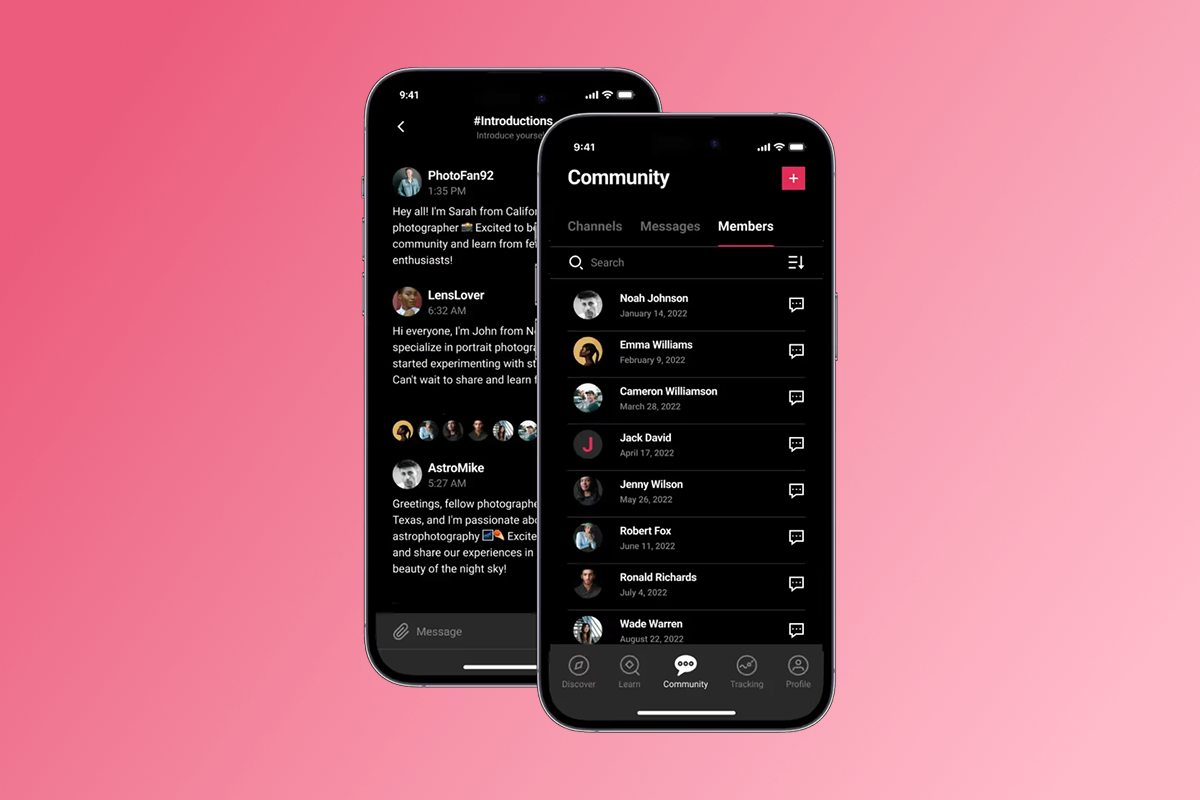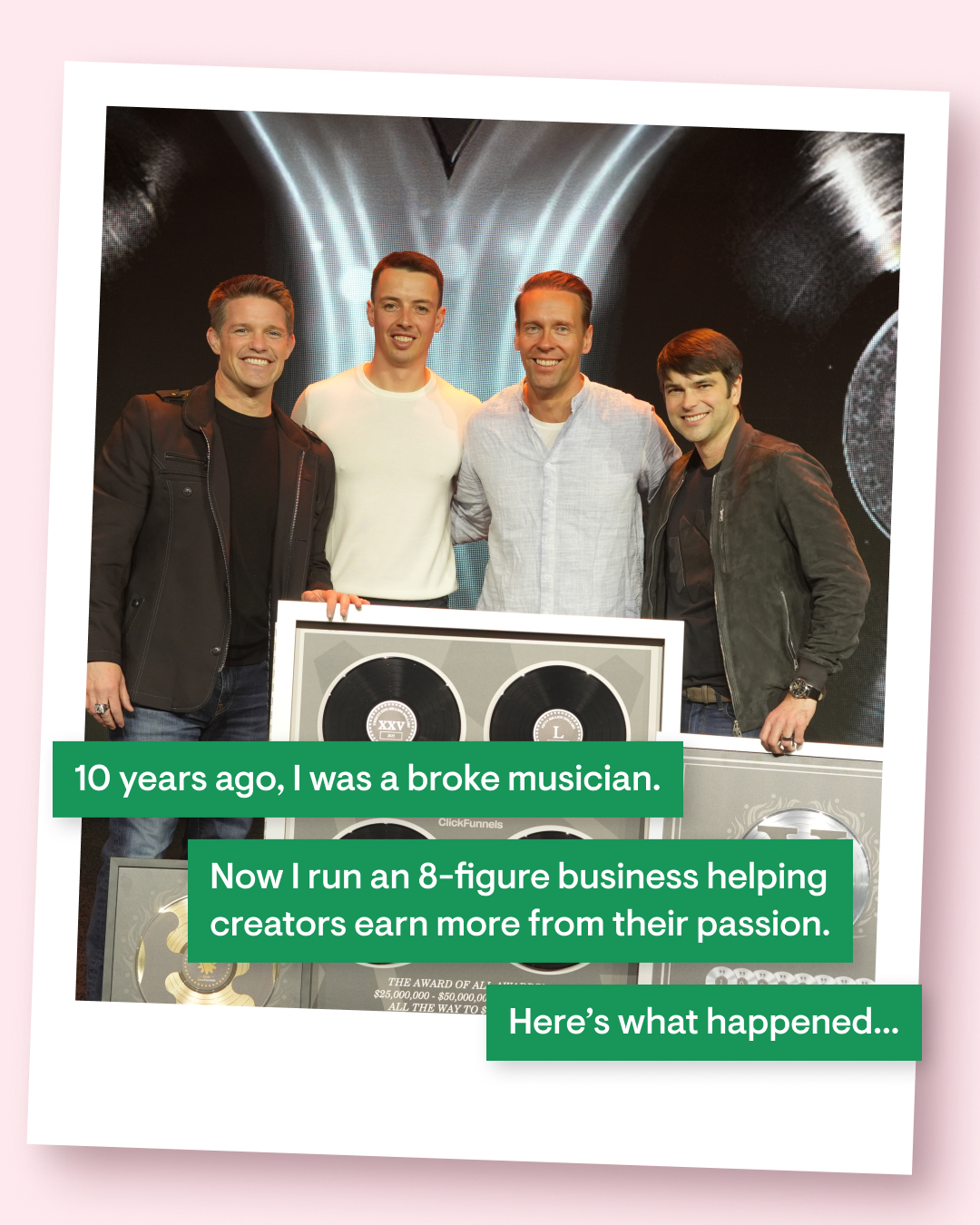Updated 6th November, 2025
You run multiple paid programs and your MRR looks solid on paper. But perhaps the constant juggling of tools, meeting links and invoices is bogging you down in busy work.
You've hit the ceiling. Not because you lack knowledge or marketing skills, but because your infrastructure creates operational drag that limits your scale.
Why your current setup can't scale past six figures
The tech stack that got you to mid-five figures becomes the bottleneck that keeps you there.
Tool sprawl creates operational drag
When you stitch together a course platform, Facebook Groups, Zoom, email sequences, and payment links, every new student multiplies your support load. Each platform bills separately. Each has its own login, dashboard, and update cycle. Your team wastes time copying data between systems, troubleshooting integration failures, and manually triggering notifications that should be automated.
Algorithm changes on social platforms can cut your organic reach overnight, forcing you to pay for ads to reach your own audience according to research on creating a personal brand as an educator. Facebook Groups live on "rented land" where policy shifts can lock you out of your community with no warning. You've built a business on infrastructure you don't own.
Fragmented engagement kills completion
Your students open four apps before breakfast. Yours isn't one of them. Email open rates hover around 20% across industries. Facebook notifications get lost in noise. Students who paid for your course forget to log in because there's no native reminder on their phone.
When your community lives in a Facebook Group competing with political rants and vacation photos, engagement suffers. Students don't complete programs. They churn after one cohort. Your revenue stays stuck in launch-spike cycles instead of building predictable recurring subscriptions.
The strategic shift: Why a branded mobile app drives scale
Top-tier online teachers have made a decisive move. They're consolidating scattered tools into a single branded mobile + web app they own and control.
Own your audience and IP
A branded app puts your name on your students' home screens. They tap your icon, not Facebook's. You own the relationship, the data, and the communication channel. When you announce a new offer or send a lesson reminder, you send a push notification directly to their device with significantly higher engagement than email.
This shift addresses the core fear every established creator shares: losing reach overnight due to algorithm changes on platforms you don't control. Your app is your platform. No algorithm decides who sees your content.
Boost engagement with mobile-first features
Mobile apps offer tools that web-only platforms can't match. Offline access means students download your lessons and watch during commutes without Wi-Fi. Progress tracking syncs across devices. Interactive features like quizzes, timers, and goal tracking are native to the app experience.
When the University of Minnesota integrated gamification into online courses, they saw completion rates jump 30%. SAP reported similar results with a 40% increase after adding badges, leaderboards, and challenges. Push notifications bring students back when engagement would otherwise drop off.
Build predictable recurring revenue
Launch spikes feel good until you realize you're rebuilding revenue every quarter. Subscription models shift that dynamic entirely. This math changes your business model entirely. Instead of hustling for the next big launch, you focus on retention and lifetime value.
A branded app makes subscriptions sticky. Students who download your app, set up their profile, and join your community are invested. Churn drops because switching costs go up.
How to scale your online teaching with a branded app
Moving from scattered tools to unified app requires four focused steps.
Step 1: Consolidate content and community
Start by mapping what's scattered: course videos on Vimeo, PDFs in Google Drive, community in Facebook Groups, payment links in Stripe. Passion's drag-and-drop builder lets you upload videos, audio files, PDFs, and text lessons without code. You structure content into modules with drip schedules that release lessons based on when students join or on calendar dates.

"Passion makes building your own e-learning app fast, simple, and stress-free. With their no-code, drag-and-drop platform, I was able to design, build, and launch a fully functional app in just a few hours—no tech experience required." - Rob M. on G2
For community consolidation, create in-app channels organized by topic. Fitness coaches might have channels for nutrition, form checks, and wins. Business coaches might separate strategy, implementation, and accountability. Students engage within your branded app, not competing with Facebook's distractions.

For DIY setup on Launch or Scale plans, expect 1-2 weeks of focused work for 10-15 core lessons. Plus handles migration as part of white-glove service, typically completing content upload and community setup within the first 2-3 weeks while you focus on your business.
Step 2: Implement mobile-first engagement
Push notifications are your most powerful retention tool. Schedule them strategically:
- Weekly content drops: "New lesson just dropped: Advanced Sales Framework"
- Milestone reminders: "You're 75% through Module 3. Finish strong!"
- Community highlights: "12 members just shared their wins. Check it out."
- Challenge countdowns: "48 hours left in the 30-Day Implementation Challenge"
Custom notifications can be targeted to specific segments, scheduled at intervals, and triggered by user activity. A student who hasn't logged in for 7 days gets a gentle nudge. A student who just completed Module 2 gets automatic congratulations and a Module 3 preview.
Step 3: Optimize for predictable monetization
Your pricing architecture determines whether you build recurring revenue or stay stuck in launch cycles. Offer tiered subscriptions: Basic ($29/month) for core curriculum, Premium ($97/month) adding group coaching, VIP ($297/month or $2,997/year) including 1-on-1 sessions.

Passion supports subscriptions, one-time purchases, bundles, and freemium models. The payment path you choose affects your margins:

Step 4: Use white-glove support for fast launch
If your time is the constraint and you want a polished app without becoming a part-time developer, Plus is the done-for-you path. Plus exists for one reason: your time is the constraint. While the team handles technical execution, you spend your hours on strategy, not app settings.
Plus includes content migration, App Store submission for both Apple Developer Program ($99/year) and Google Play Developer ($25 one-time), branding implementation, named success manager, and growth coaching.
Timeline: web app live within 2 weeks, App Store submissions underway by week 3-4. Total launch typically completes in 4-8 weeks depending on App Store review times.
Passion Plus: Your done-for-you path to scale
White-glove service means minimal founder time and maximum speed to revenue.
What Plus delivers
Beyond basic app building, Plus provides strategic implementation: Apple and Google developer account management, iOS/Android/web app configuration, content migration and structuring, payment gateway setup, push notification strategy, and pricing architecture consultation based on your niche.
The Plus team brings pattern recognition from launching thousands of creator apps across fitness, wellness, business coaching, and skills training. You get that playbook applied to your specific business. Access to the Expert Unleashed Challenge training is included, where 72% of participants generate over $1,000 in the first 30 days.
"Passion team always answers my emails and questions. Running an app as a computer illiterate creator isn't easy but passion makes it simple!" - Dana Martin on Trustpilot
Total cost of ownership comparison
Passion Plus over 12 months:
- Upfront: Plus scope ($10,000-$20,000 custom quote), Apple Developer ($99), Google Play Developer ($25 one-time)
- Upfront total: ~$10,124-$20,124
- Ongoing: Expand plan $599/month ($7,188 annually), PassionPayments (3.9% of web revenue), IAP fees (15-30% if used)
- 12-month total: ~$17,312-$27,312 (excluding transaction fees)
Custom app development:
- Upfront: $30,000-$100,000+
- Ongoing maintenance: $2,000-$5,000/month
- No training or monetization playbooks
- 12-month TCO: $54,000-$160,000+
Stitched-together tools:
- Course platform ($199-$499/month), email marketing ($150-$300/month), community platform ($99-$299/month), Zapier ($50-$200/month)
- Monthly total: ~$500-$1,300 with worse engagement and no mobile app
- This doesn't include the hours your team burns managing integrations, troubleshooting breakages, and manually syncing data between systems.
Success patterns
Savannah Bohlin, a wellness creator, built "The Portal" using Passion with 250 subscribers at $22.22/month, generating $66,660 in annual recurring revenue. Her app's offline access and push notifications drive higher completion than her previous web-only setup.
Cirque+ brings aerial arts training to mobile, providing video tutorials and a global community. Their mobile-first approach addresses the unique need for students to access content in gyms and studios where pulling up a website is impractical.
Addressing enterprise creator concerns
Two questions come up most frequently from established creators evaluating Passion Plus.
App Store timelines
Both Apple and Google review submitted apps before they go live. Typical timelines: Apple App Store takes 2-7 days for initial review, potentially 1-2 weeks if clarifications are needed. Google Play Store takes 1-3 days for initial review with faster iteration on updates.
Plus clients get submission support, meaning the team handles technical requirements, metadata optimization, and screenshot preparation. If review delays occur, your web app remains fully functional.
Platform comparison
Kajabi and Thinkific excel at course hosting, email funnels, and sales pages. Users appreciate their all-in-one features. However, their mobile experience remains browser-based without true native apps featuring push notifications and offline access. If your students consume content primarily on phones and you want push-driven retention, Passion delivers what web-first platforms can't match.
Custom development offers unlimited flexibility. You'll also pay $30,000-$100,000+ upfront, wait 6-12 months to launch, and require ongoing developer resources for updates. Passion trades some customization depth for 10x faster launch, significantly lower cost, and included monetization training.
Trade-offs to acknowledge: Passion's live streaming relies on integrations with YouTube or Zoom rather than built-in features. For most established creators running cohort-based programs with recorded content and community, this integration approach works well. If you run daily live-only programming, evaluate whether the YouTube/Zoom workflow meets your needs during your demo.
Take control and scale your teaching impact
You've built a successful online teaching business through expertise and hard work. The next chapter isn't about working harder. It's about infrastructure that supports recurring revenue, owned audience relationships, and engagement that drives completion.
A branded mobile + web app consolidates your scattered tools, gives you direct communication through push notifications, and positions your programs as premium offerings worth higher prices. The path from concept to live app takes weeks with white-glove support handling technical execution while you focus on teaching and serving your community.
Book a Passion Plus demo to explore white-glove implementation for your specific niche. See confidential case studies showing six-figure growth in fitness, business coaching, and skills training. If you prefer to test the platform yourself first, start with the Launch plan and 30-day money-back guarantee. Verify current trial and guarantee status at signup.
Frequently Asked Questions
How quickly can Plus migrate 50+ existing courses and 2,000+ members?
Plus completes full content migration and member import for catalogs of 50-100 courses within 3-4 weeks, including restructuring modules, setting up drip schedules, and configuring member tiers. You can import student lists via CSV for immediate access setup.
What happens if Apple or Google rejects my app submission?
The Plus team manages resubmissions with required adjustments. Your web app remains fully functional during any review delays, typically 1-2 weeks maximum.
How do I choose between PassionPayments and in-app purchases?
Route higher-priced subscriptions and bundles through PassionPayments web checkout (3.9% fee) for better margins. Use IAP (15-30% fee) for convenience on mobile or lower-ticket impulse purchases.
Does Passion support external payment processors?
Yes, via Zapier. External purchases sync into Passion automatically, with 0% platform fee from Passion.
Key Terms Glossary
Monthly Recurring Revenue (MRR): Predictable revenue generated each month from active subscriptions, calculated by multiplying subscriber count by average subscription price.
PassionPayments: Passion's integrated payment gateway for web checkouts, charging a 3.9% platform fee plus standard Stripe processing fees.
In-App Purchase (IAP): Transactions completed within native mobile apps (iOS/Android), where Apple or Google retain 15-30% depending on business program eligibility.
Push Notifications: Direct messages sent to users' mobile devices even when the app isn't open, achieving higher engagement than email.
Tool Sprawl: Using multiple disconnected platforms for course hosting, community, payments, and communication, creating operational complexity, higher support costs, and data silos that prevent accurate reporting on student engagement and lifetime value.














